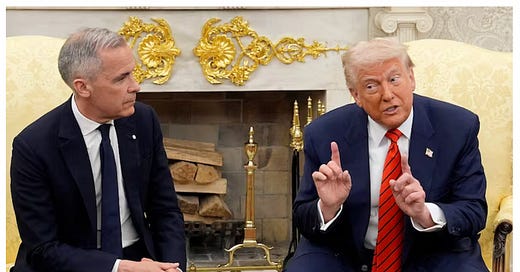Trump, Trade, and the Truth
Canadians buy 7x more from the U.S. per person than Americans buy from us.
In total trade (goods + services), the U.S. deficit with Canada in 2024 was ~$31.6 billion—not the $200 billion Trump claims.
Canada is the #1 customer in the world for U.S. exports. Not China. Not Mexico.
Strip out Canadian energy exports and the U.S. actually runs a trade surplus with us.
A trade deficit isn’t theft—it’s just supply and demand.
Bottom line: As individual consumers, we actually have 7 times more influence per person than Americans do. More leverage. More ability to express our values with our wallets. Build Canadian. Buy Canadian. Believe in Canada.
In the age of slogans and soundbites, it’s worth doing some actual math. So here it is: per person, Canadians buy far more from the United States than Americans buy from Canada. That’s the overlooked truth behind Donald Trump’s repeated claims that Canada is ripping off the U.S. on trade.
Let’s look at the most recent, official numbers from the U.S. Department of Trade.
In 2024, the United States exported $349.4 billion in goods TO Canada and imported $412.7 billion FROM Canada, resulting in a trade deficit of $63.3 billion. Add services, and the U.S. exported another $86 billion while importing $54.3 billion, giving the U.S. a $31.7 billion surplus in services. That puts the total trade deficit with Canada at around $31.6 billion. A tidy number, certainly not small—but also not the $200 billion Trump claims, unless he’s rounding up by a factor of six.
Now, let’s break that down by population.
Canada, population 40.1 million, imported $349.4 billion in U.S. goods in 2024. That’s about $8,714 per Canadian. The U.S., population 334.9 million, imported $412.7 billion in Canadian goods. That’s just $1,232 per American. On a per capita basis, Canadians buy SEVEN TIMES as much from America as Americans do from Canada.
Viewed through this lens, Trump’s grievance doesn’t look like righteous fury—it looks like bullshit. And that of course is what it is. It’s just worth writing it out and saying it so that we don’t get buried under the huge pile of it being shoveled by the legacy and social media of all sort. Canada is not freeloading—it’s buying far above its weight.
Canada is the U.S.’s largest export market—not China, not Mexico. The U.S. sells more goods to Canada than to any other foreign country. U.S.–Canada trade is deeply integrated. Much of what Canada ships to the U.S.—especially in energy and auto parts—becomes part of America’s own production.
So why the trade deficit?
Mostly energy. Canada’s energy exports—crude, gas, electricity—make up a third of our trade to the U.S., and they’re essential to U.S. energy security. Strip out energy, and the U.S. actually runs a surplus with Canada.
And that $200 billion Trump mentions? It’s pure fiction. There’s no evidence for it in any trade or budgetary document. A trade deficit is not a subsidy. It’s just arithmetic: Americans spend more, particularly on imported energy. That’s not a handout to Canada. It’s supply meeting demand.
Canadians should read this as a reminder that we matter, that our trade relationship with America is both reciprocal and essential. And Americans should see this for what it is: a good deal.
So all this “buy Canadian” talk? It’s missing the bigger picture. The real headline here is that, despite the way the story’s being spun, we—Canadians—are the big spenders in this relationship. Not the Americans.
On a per person basis, Canadians buy seven times more from the U.S. than Americans buy from us. Seven times. That makes us their best customer, not their trade problem.
We’re doing our best. Seriously. Small country, big tab.
And while we’re unfailingly polite about it, let’s not forget an old truth from the world of commerce: the customer is always right.
That means, as individual consumers, we actually have more influence per person than Americans do. More leverage. More ability to express our values with our wallets. So the next time you hear a speech about who’s winning or losing at trade, remember: the numbers say otherwise.
Small country. Big buyer. We're doing our best.








